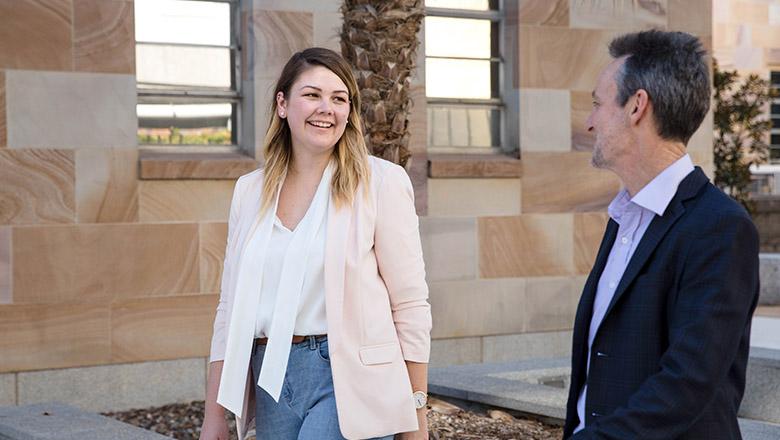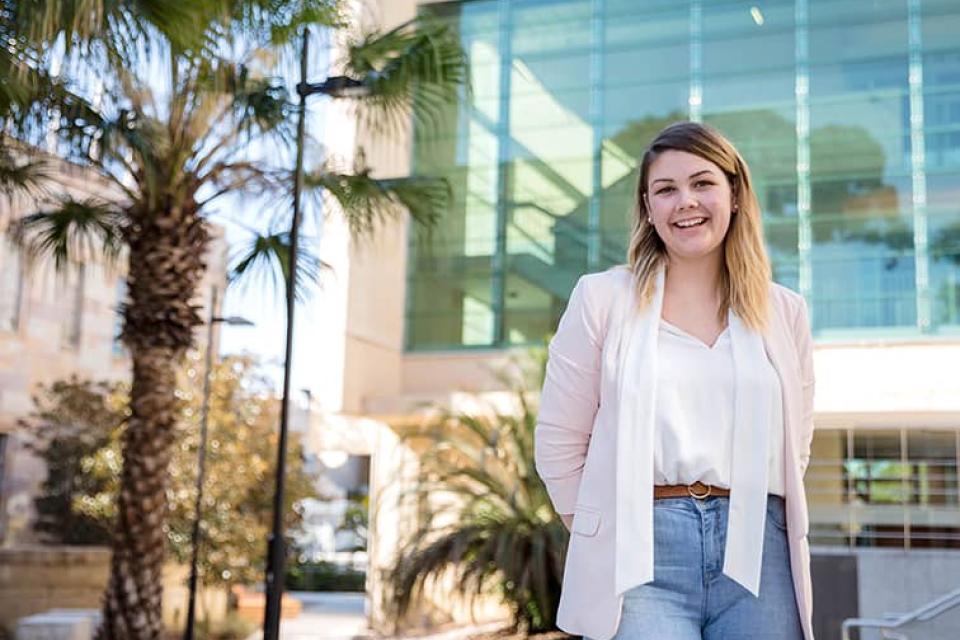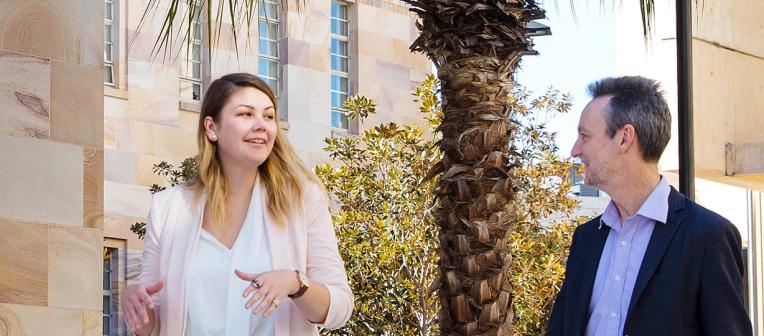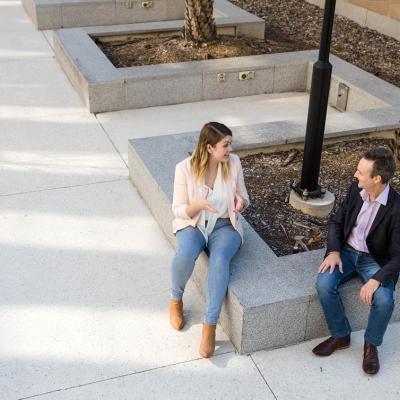Ever wondered what it's like to do a PhD at UQ? Choosing the right pathway can be hard, especially when there are so many unknowns out there, but these tips for PhD students could help you hit the ground running.
How do I choose a PhD supervisor? Can my PhD topic be different to my undergrad studies? What kind of PhD scholarships are available?
PhD candidate Samantha and her supervisor Professor Glenn King have teamed up to answer questions and provide some tips for PhD students.
Why did you want to do a PhD?
Samantha: I chose to do a PhD because I really wanted to make a difference through science. I wanted to be able to help people, I wanted to be able to help animals, and I wanted to be able to study the natural world. So getting to do a project for 4 years and learn all the techniques that would help me get those skills just seemed like the best way to do that.
What's your favourite thing about being a PhD supervisor?
Glenn: My favourite thing is watching PhD students grow in confidence as they go through their PhD. What I tell students at the very beginning is, by the end of their PhD they should be the world expert in their topic and they should know more than me. And that's generally true.
By doing a PhD they become confident. They're going out presenting their work at conferences, they're interacting with the peers in their field, they're taking that next step in their career, they've learned how to plan their research project, they’ve learned how to write an impactful research paper, and just watching that progression is wonderful, but even more than that, watching what they achieve when they leave the lab is also an exciting part of being a PhD supervisor.
How is your PhD different to your undergraduate studies?
Samantha: First of all, my PhD and undergrad were completely different topics. You don't have to be afraid that you have keep working in the same field; you can branch out and try new skills, new areas. I worked on wombats and bilbies and then I moved into spiders for my PhD. The first thing was the spiders were far more bitey than the wombats were.
I think the biggest thing was, in my undergraduate it was much more structured, there was someone there who was giving me more of a plan, more step-by-step instructions. And then, when you come into your PhD, it's really more about guiding your own project, you need to come up with the questions, you need to come up with a plan, a strategy, and you need to be resilient and think about what you can do when things go wrong because they will go wrong.
I think that's really the big difference for me. In undergrad there was someone who was telling me what to do and how to do it. In my PhD, it was really driven by me but you still have someone there to support you. It's just much more independent.

Why are you passionate about research?
Glenn: For me it's more about trying to do something that's useful. Most of the research in my lab is highly translational. What we're trying to do is develop environmentally friendly insecticides or even therapeutics for pervasive human disorders like chronic pain and stroke. So I'm always focused on what the outcome will be but at the same time satisfying that thirst for intellectual knowledge as we move through that process of developing drugs or developing new insecticides.
Why did you choose to do your PhD specifically here at UQ?
Samantha: I think UQ is really one of the world leaders in life sciences and certainly for venom research, and I was really interested in not just doing something that would take place in the lab. I wanted my research to have real-world impact in neglected tropical diseases, in wildlife biology.
UQ is really great at translating those discoveries from early, initial lab-based work to commercialised, real-world outcomes. We have with the cervical cancer vaccine, we have with some of our solar power work, and that's what drove me to come here over any other university.
What scholarship have you been awarded and how did you find out about it?
Samantha: So I'm very lucky to have several scholarships to support my PhD. I highly recommend anyone applying for PhDs to look for scholarships, because having scholarships has really enabled me to do so much more because I had that financial support, which meant that I could pursue my other interests in science communication and community engagement and policy work.
I have a Westpac Future Leaders Scholarship from the Westpac Bicentennial Foundation, which is for leadership and research that will improve Australia's future. I also have an Australian Government research scholarship and a scholarship from the Borrows Wellcome Trust. The way that I found out about those fellowships was really through talking to existing PhD students, the graduate school and our research liaison officer. I found the Westpac scholarship through some googling, reaching out to my network and finding out what other options were available.
I didn't want to just do a PhD, I wanted to be able to learn from people overseas and I wanted to be able to take my discoveries from the lab out into the real world. The Westpac scholarship really enabled me to do that by giving me the opportunity to study in America, to study in Europe, to go to Antarctica, and even work in the Amazon, which really gave me the edge for my venomous animal research.

What are the best tips you would give to someone who's considering doing a PhD at UQ?
Glenn: The primary advice I would give is to choose a topic that you're passionate about. It could be because you're intellectually passionate about it, or because you're after a particular outcome such as developing a new drug or developing a new insecticide, but you must be passionate about it because there are going to be points where it will be difficult. There will be long hours and you need to have the passion and enthusiasm to drive through those difficult moments.
One thing I get asked by a lot of PhD students is, does this determine my future career path? And the answer is no, it does not. So the PhD provides you with a basic set of skills in the biological sciences, which is a platform for then moving into any particular area. So the PhD doesn't define what your future career will be in terms of your scientific discipline, it just provides a base of experience and skills to go on with.
How do you think your PhD has benefited you, both professionally and personally?
Samantha: I think my PhD has benefited me in a lot of ways that I didn't necessarily expect. Personally I think it has improved my confidence. It has given me a fantastic network of people doing the most incredible research in everything from spider venom, to neglected tropical diseases, to drug discovery that I wouldn't have been able to get if I hadn't had this learning opportunity and the ability to explore my research, and my area of passion.
Professionally I think it's given me so many skills, everything from time management – I had to manage my own projects which were international collaborations – and how to learn how to communicate with people who came from very different areas of science and very different cultural areas.
Those are the kind of skills that will be really valuable in whatever job you go into whether that be some sort of industry position, policy, traditional academic research or clinical because no matter what you've got, you've gained a lot of skills in critical thinking, in problem solving and general resilience that I think I'll carry with me, even after I finish.
What made you decide to be my supervisor?
Glenn: So I was really lucky that Samantha had spent a year in my lab already doing an honours research project, which is a one year research project and we've spent about a thesis at the end describing the research. So I had a chance already to work with Samantha in the lab as part of my team for 10 months. I knew she would be a brilliant PhD student because she was intellectually gifted, she is passionate about research which is the most important thing, she was perseverant, which is also really critical for research, to push through the difficult moments and she wrote very well, which is also important.
She was already a good public speaker at that stage, I knew that we would turn her into a media superstar by the time she finished her PhD. That's turned out to be the case.
Why is mentorship so important in our field, and why are you so passionate about it?
Glenn: I'm very passionate about mentorship and I think that my most enduring legacy will actually be the PhD students that I’ve mentored, not the research science that I published because they are the next generation of scientists. Without mentoring PhD students, there would be no future generation of research scientists, so I'm very passionate about that.
It's very important that we transfer our skills, our skills are often built up over many decades and it's important to transfer that knowledge to our students so they can take it forward, set up their own labs and attract their own students.
Your research career begins here at UQ. Explore our scholarships or submit an expression of interest now.






